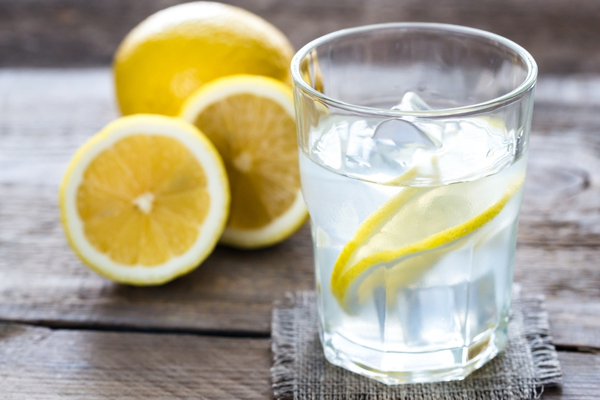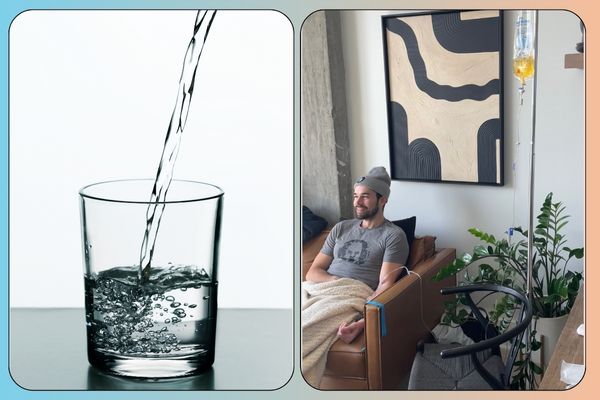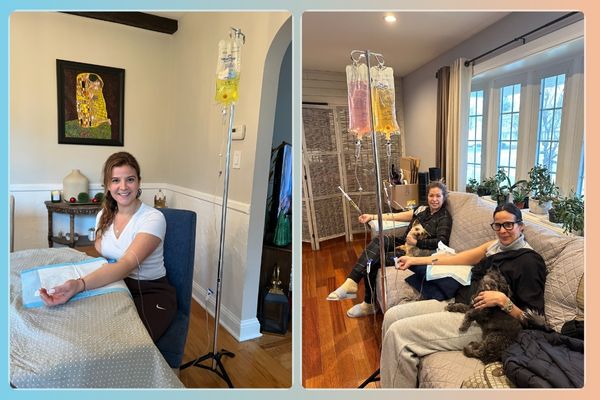
Water vs. IV Therapy: Which Hydrates Better and Why
January 31, 2025
We all know that staying hydrated is essential for overall health. Whether it’s keeping your energy levels up, supporting digestion, or maintaining clear skin, hydration plays a huge role in how we feel every day. But how we hydrate matters just as much as how much we hydrate.
For most people, drinking water is the go-to solution. It’s simple, effective, and necessary for survival. But sometimes, water alone isn’t enough—especially when dehydration hits hard. That’s where IV therapy comes in.
IV hydration, commonly used in hospitals and now widely available through mobile IV therapy services, delivers fluids directly into your bloodstream. This method provides instant hydration, bypassing the digestive system and giving your body the fluids and nutrients it needs much faster than drinking water.
So, which is the better option? While both have their benefits, IV therapy is the fastest and most efficient way to rehydrate when your body needs an immediate boost. Let’s break down how each method works and when you might need more than just a glass of water.
IV Therapy vs Water: How Hydration Works in the Body

Drinking Water: The Slow and Steady Approach
When you drink water, it doesn’t go straight to your cells. Instead, it follows a process:
- Absorption Through Digestion – Water first travels to your stomach and then to your small intestine, where it’s absorbed into your bloodstream.
- Distribution to Cells – Once in your bloodstream, the water slowly makes its way to your organs, muscles, and tissues.
- Hydration Takes Time – Depending on how dehydrated you are, it can take several hours for your body to fully benefit from drinking water.
While this process works fine for daily hydration, it’s not the fastest solution when your body is severely dehydrated, recovering from illness, or needing an electrolyte boost.
IV Therapy: The Fast-Track to Hydration
IV (intravenous) therapy works differently because it skips the digestive system altogether. Here’s how:
- Direct Delivery to the Bloodstream – Instead of waiting for water to be absorbed in your gut, IV fluids are administered straight into a vein through an IV drip.
- Immediate Absorption – Since the fluids don’t have to pass through the digestive system, your body instantly receives the hydration it needs.
- Added Nutrients and Electrolytes – Unlike water, IV therapy can include electrolytes, vitamins, and minerals c
Water vs. IV Therapy: A Quick Comparison
| Factor | Drinking Water | IV Therapy |
|---|---|---|
| Absorption Time | Hours – Water needs to go through digestion before hydrating cells. | Immediate – Fluids enter the bloodstream instantly. |
| Efficiency | Less efficient in cases of dehydration. | More efficient, especially for severe dehydration. |
| Electrolytes & Nutrients | Requires food or supplements for added nutrients. | Can include vitamins, electrolytes, and minerals. |
| Best For | Daily hydration, mild thirst. | Rapid rehydration, illness recovery, hangovers, athletic performance. |
Bottom Line? If you’re just feeling a little thirsty, drinking water is the best (and cheapest) way to hydrate. But if you’re seriously dehydrated, feeling fatigued, or recovering from illness, IV therapy is the fastest way to replenish fluids and nutrients.
Hydration Through Drinking Water
Water is life. It’s the most natural way to stay hydrated, and thankfully, it’s easily available—just turn on the tap or grab a bottle. But while drinking water is essential for daily hydration, it does have its limitations, especially when it comes to how quickly your body absorbs it.
✅ Pros of Drinking Water for Hydration
✔ Easily accessible and inexpensive
- Water is everywhere. Whether from a bottle, a filter, or straight from the tap, it’s the simplest and cheapest way to hydrate.
✔ Supports digestion and natural detoxification
- Your body relies on water to break down food, absorb nutrients, and flush out toxins through your kidneys and liver. Staying hydrated keeps these processes running smoothly.
✔ Helps maintain daily hydration needs
- If you’re not dehydrated and just need to replenish fluids, sipping water throughout the day is enough to keep your body balanced.
❌ Cons of Drinking Water for Hydration
✖ Absorption rate is slower
- Your body doesn’t instantly absorb the water you drink. It first has to pass through your digestive system, which can take time—especially if you’re already dehydrated.
✖ May not be enough in cases of severe dehydration
- If you’re vomiting, sweating excessively, or have lost fluids quickly (from illness or intense activity), drinking water alone might not be enough to replenish your body fast enough.
✖ Excessive water intake can lead to electrolyte imbalances (overhydration)
- Yes, there is such a thing as drinking too much water. Overhydration can dilute important electrolytes, leading to issues like hyponatremia (low sodium levels), which can cause confusion, headaches, and in extreme cases, serious health risks.
Hydration Through Mobile IV Therapy

While drinking water is great for daily hydration, sometimes your body needs more than what a glass of water can provide. Mobile IV therapy offers a fast-track solution for when you need to rehydrate quickly and efficiently. It’s been widely used in hospitals for decades, but now, mobile IV therapy makes it easy to get this treatment in the comfort of your home.
✅ Pros of Mobile IV Therapy
✔ Immediate hydration, bypassing the digestive system
- IV therapy skips the stomach and delivers fluids directly into your bloodstream, meaning your body absorbs 100% of what it receives instantly.
✔ Delivers not only fluids but also essential electrolytes, vitamins, and minerals
- Unlike plain water, IV therapy can be customized with electrolytes, Vitamin C, B-complex, magnesium, and more—perfect for energy, immune support, or recovery.
✔ Ideal for rapid recovery (e.g., after illness, hangover, intense workout)
- Whether you’re recovering from food poisoning, a tough workout, a night out, or jet lag, IV therapy replenishes lost fluids faster than drinking water alone.
❌ Cons of Mobile IV Therapy
✖ More expensive than drinking water
- IV therapy is an investment in your health, but it comes at a cost. It’s more expensive than simply drinking water, but the benefits often outweigh the price—especially when quick recovery is needed.
✖ Requires professional administration
- Since IV therapy involves a needle and a drip, it must be administered by a trained professional. Fortunately, mobile IV services make it easy to get treatment at home without visiting a hospital.
✖ Not needed for mild dehydration
- If you’re just feeling a little thirsty or had a light workout, drinking water is usually enough. IV therapy is best for moderate to severe dehydration or when you need a rapid boost of vitamins and electrolytes.
Key Situations Where IV Therapy is More Effective Than Water
Drinking water works for daily hydration, but in certain cases, IV therapy is the faster, more effective solution.
Severe Dehydration: When Fluids Are Urgently Needed
Excessive sweating, vomiting, diarrhea, or heat exhaustion can cause rapid fluid loss, and water alone may not be enough.
💧 Why IV Therapy is Better:
- Bypasses digestion for immediate hydration.
- Replenishes electrolytes like sodium and potassium.
- Works even if nausea prevents drinking fluids.
Athletic Performance & Recovery
Strenuous exercise depletes fluids, electrolytes, and nutrients, leading to fatigue and cramping.
💧 Why IV Therapy is Better:
- Restores hydration faster than drinking water.
- Delivers electrolytes and amino acids for quicker recovery.
- Prevents muscle cramps and fatigue.
Hangover Relief
Alcohol dehydrates the body, causing headaches, nausea, and fatigue. Water helps, but IV therapy works faster.
💧 Why IV Therapy is Better:
- Instantly rehydrates and restores lost electrolytes.
- Includes anti-nausea medication for relief.
- Delivers B vitamins and magnesium to boost energy.
Illness Recovery
Flu, food poisoning, and stomach bugs can make drinking fluids difficult due to nausea.
💧 Why IV Therapy is Better:
- Hydrates even if you can’t keep water down.
- Provides immune-boosting vitamins like Vitamin C and Zinc.
- Speeds up recovery and restores energy.
IV Therapy vs Water: Which One is Right for You?
- For daily hydration, drinking water is enough.
- For rapid rehydration, especially after illness, intense workouts, or dehydration, IV therapy is the better option.
- Mobile IV therapy allows for customized hydration, including vitamins and electrolytes tailored to your needs.
Staying hydrated is essential, and while water works for daily hydration, IV therapy is the fastest and most effective solution when your body needs immediate replenishment. Whether you’re recovering from an illness, battling dehydration, or need a quick boost after an intense workout, mobile IV therapy delivers fluids, electrolytes, and vitamins directly into your bloodstream for rapid relief.
If you’re looking for mobile IV therapy in NJ, let Uplift IV & Wellness bring hydration straight to your doorstep. Book your session today and experience fast, effective hydration from the comfort of your home!